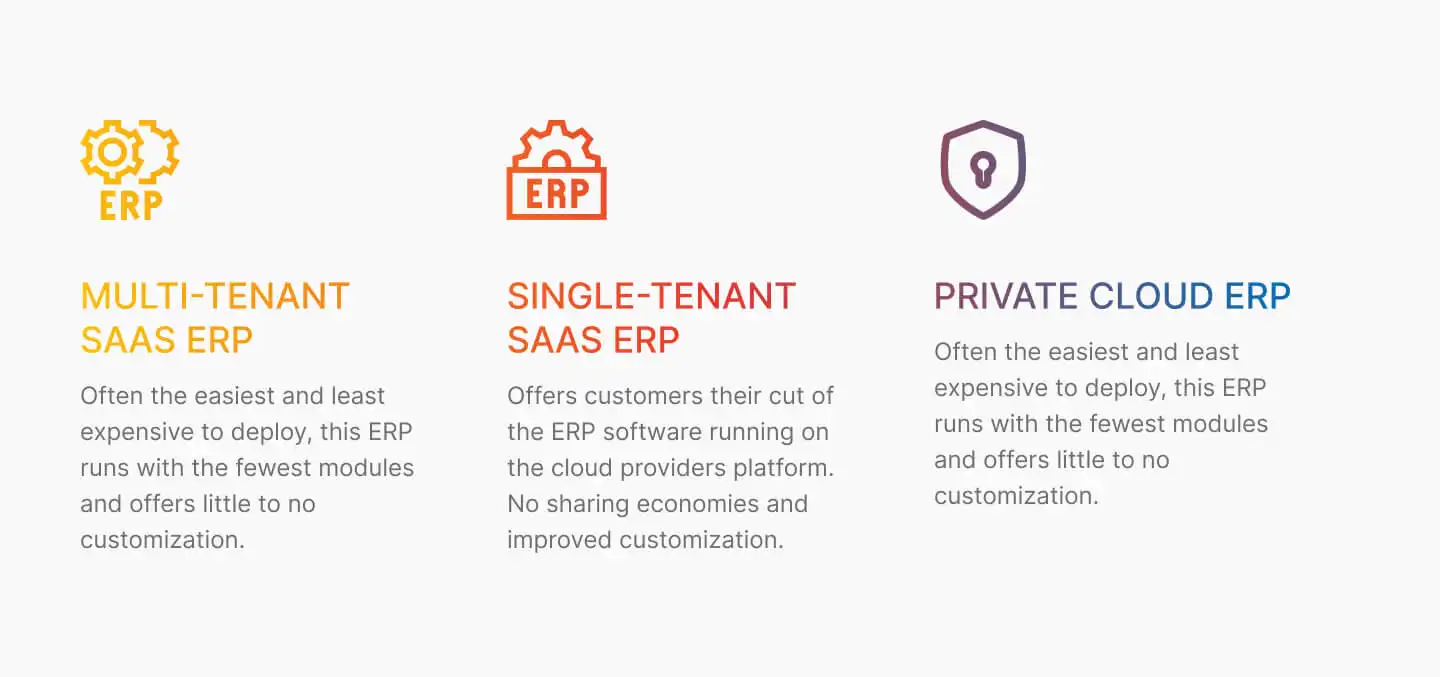Businesses are under increasing pressure to streamline their operations, improve efficiency, and drive growth. To achieve these goals, many are turning to cloud-based solutions, including cloud-based ERP software.
In a study by Panorama Consulting Solutions, ERP implementation led to business process improvement of 95% for organizations. This trend is particularly evident with cloud ERP solutions, as they deliver a wider range of benefits than on-premises ERP systems.
For more information, this blog post will explore what cloud-based ERP software is, why businesses are turning to cloud data storage and management solutions, and the benefits that a cloud ERP has over an on-premise ERP.
What is Cloud-Based ERP Software?
Enterprise Resource Planning (ERP) software helps businesses manage their core processes and operations, such as finance, manufacturing, supply chain management, human resources, and more. They integrate data business-wide into a centralized database, providing a real-time, holistic overview of an organization’s operations.
Are You Still Struggling With ERP Implementation?
In a cloud ERP, like Oracle ERP Cloud, the applications are hosted on remote servers, as is your data (though, of course, you retain control over everything). It enables users to access cloud applications over the Internet through servers hosted by a third-party provider.
Here are 5 key components of a cloud ERP system:
- Real-Time Information Accessibility: Oracle Fusion Cloud ERPs offer real-time data updates that are accessible from any location. This feature provides businesses with current, accurate information, enabling quick, strategic, and informed decision-making processes.
- Global Accessibility: These systems can be accessed from anywhere with an internet connection. This enables remote work and increases productivity and flexibility.
- Easy Integration: Oracle Fusion Cloud ERP systems are designed to integrate seamlessly with other cloud-based applications. This integration capability allows for a cohesive end-to-end solution.
- Customization and Scalability: Oracle Fusion Cloud ERP systems can be easily customized to fit a company’s specific needs. Additionally, these systems offer scalability, allowing businesses to increase or decrease their usage based on current needs.
- Cost Effectiveness: The Software-as-a-Service (SaaS) model of cloud-based ERP systems eliminates upfront hardware costs and ongoing application maintenance costs.
| For more relevant information, visit our following related blogs: |
Why Do Businesses Use Cloud-Based ERPs?
Most businesses use cloud-based ERPs for their cost-effectiveness, easy scalability, and to support remote workers. However, these are not the only benefits.
- Automatic Upgrades: The cloud software is upgraded on the software vendors schedule and mostly likely on a quarterly basis. Customers do not need to invest in an upgrade cycle, and the latest software is available to use every quarter.
- Additional Features: Cloud applications may offer additional capabilities that are specifically designed for the cloud environment, such as mobile access, social collaboration, and real-time data analytics.
- Stronger Security: Many cloud ERP vendors provide strong security measures, including data encryption and secure data centers. This helps protect sensitive information.
- Ease of Implementation: Compared to on-premise ERP systems, cloud-based solutions are generally quicker and easier to implement.
- Sustainability: By using a cloud-based ERP system, businesses can reduce their environmental impact. This is because it minimizes the use of hardware that contributes less to electronic waste.

On-Premise ERPs vs Cloud-Based ERP Systems
The biggest difference between on-premise and cloud-based ERP systems is where the data is held. On-premise ERPs are installed and operated on a company’s servers whereas cloud-based ERPS are hosted on a cloud server or servers.
However, there are a few more key differences.
| Cloud-based ERP | On-Premise ERP |
| Typically a flat subscription-based rate. | Ongoing and fluctuating costs for upgrades, maintenance, and support. |
| Generally quicker to deploy as no physical installation is required. | Longer implementation time due to need for hardware installation. |
| Regular updates managed by the provider. Lower risk of running outdated software. | Updates need to be manually installed. Higher risk of running outdated software. |
| Security measure depend on the provider. | More control over security measures. |
| Easily scalable as business grows. | Requires additional hardware and software purchases to scale up. |
| Accessible from anywhere with internet connection. | May require additional setup for remote access. |
| Disaster Recovery is typically included in service by the provider. | Disaster recovery may require separate planning and implementation. |
Please note that the details in this table are typical characteristics and may vary depending on the specific cloud-based or on-premise ERP solution chosen.
Cover Your Needs With NexInfo’s Cloud-Based ERP
Oracle Fusion Cloud ERP software can provide numerous benefits for businesses of all sizes and industries. From lower upfront costs and faster implementation to improved scalability, accessibility, and security, cloud-based ERPs can help businesses streamline their operations and achieve greater efficiency and profitability.
At NexInfo, we understand the challenges that businesses face when implementing new technology solutions. That’s why we offer comprehensive cloud-based ERP implementation services that can help businesses of all sizes optimize their operations and achieve their strategic goals.
Our team of experienced consultants and engineers can help you choose the right cloud-based ERP software for your business, implement the solution quickly and efficiently, and provide ongoing support and maintenance to ensure that your system is always up-to-date and running smoothly.
By partnering with NexInfo, businesses can leverage the power of Oracle Fusion Cloud ERP software to drive growth, improve efficiency, and stay ahead of the competition. So if you’re looking to take your business to the next level, contact us today to learn more about our cloud-based ERP services and how we can help you achieve your goals.








